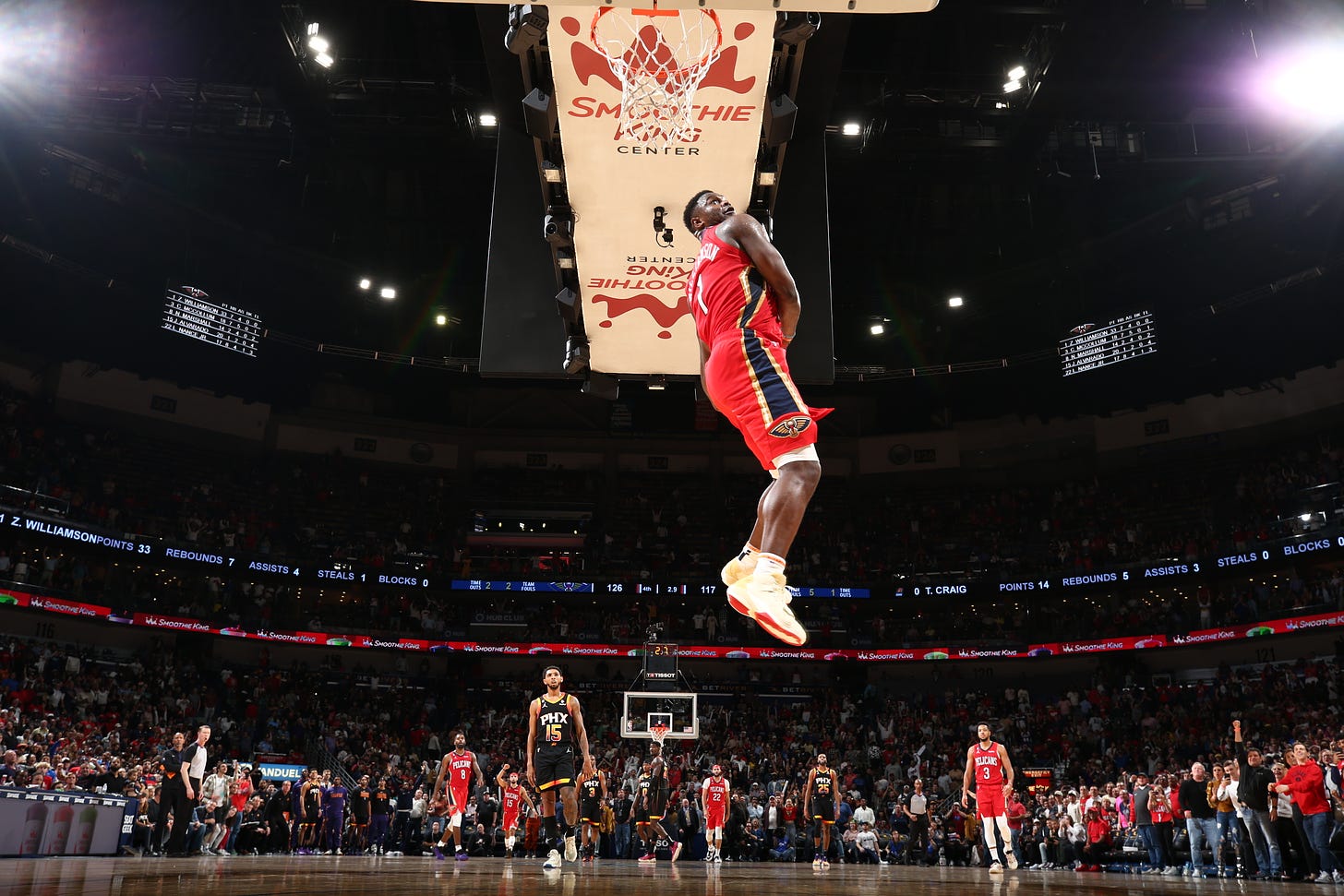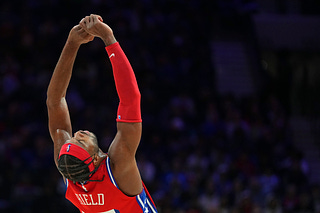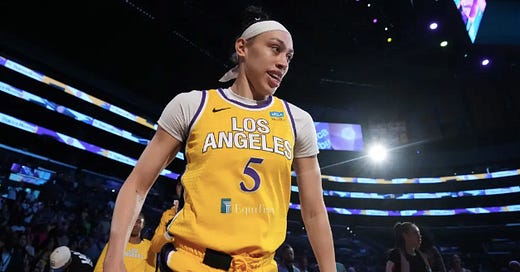

Discover more from BASKETBALL FEELINGS
Sports, but make it content
The more we lose writers and places to write, the more we lose wider interpretations of the world. Even in basketball writing.
What does culture, disintegrating, look like? Personally, I think it’s the ready conversion of art, or work, into Content. I was going to say the sublimation of art into content, but that suggests the intrinsic instinctual impulse remains intact from one form to the other. Art isn’t made to be shared — it often will be, but that isn’t its driver at inception — Content is.
No matter how online you are, when you read the word Content your brain conjures something specific: a tweet, a meme, an NFT (hopefully not, but those were the perfect example of Content considering itself a sublimation of art), maybe a blog. We’re post-Content now in the sense that beyond what you picture, the word presents a prompt of engagement, one you probably follow every day.
It’s the conceit of Content I’m against. What the rise of Content as form has done to our habits, our memories, how we interact with art and culture, with each other. The speed it promotes, the sheer volume it promises, that we use the word ‘consume’ as a preface for it because by nature, it’s disposable. To consume Content starts off feeling easy, innocuous, but the associations with the verb give away pretty aptly the sensations that follow: drain, exhaust, waste.
Vivian Gornick said she was able to write the way she wanted to, in what became her signature style of personal narrative, because The Village Voice gave her the space and money to do it. She credits the writers around her working within the style of personal journalism, and the specific time and place, for nurturing the form she found:
The time and the place—New York City in the 1970s—were propitious: it was a moment when “everyone” seemed to be writing in the first person. By “everyone,” I mean people like Tom Wolfe, Joan Didion, Norman Mailer.
It’s not a new complaint to point out that writers of subsequent generations have it harder, stranger, worse than writers who came before. But it does seem new to note that not only are we losing the places to write for and the financial incentive to do it — we’re also losing the writers.
It can be a bucolic thing to picture, looking back on magazine writers who made enough to live in cities like New York and Los Angeles, adjacent to their peers and knit into the fabric of a subculture forming, who could travel for perspective or take time off to idle and replenish their ideas. Journalists who were free to roam between subjects, to recognize the necessary overlaps in art and politics, or politics and culture, and trace them to their shared roots to make sense of a greater whole, a larger moment. Or reporters at papers who covered just one beat instead of being tasked with the job of propping up the whole section. But gradually, retrospectively, those heydays don’t seem as halcyon as they did a decade ago, they seem impossible. More than that, without contemporary examples to draw from because no working writers live like this and more and more writers aren’t working, they’re becoming unimaginable.
We’re going through some of the worst humanitarian, ecological and existential crises in history and it isn’t just journalists, writers, and artists we look to for closer comprehension of what’s happening to us, they’re also de facto record-keepers. As they jettison out of crumbling industries or have their livelihoods yanked from under them, huge gaps are going to result, gaps we can’t be aware of until years down the road. These are also the people who excel in finding tangible and emotional connections from present to past, oftentimes to help our future selves process life and improve existence overall. This isn’t grandiose, if anything it’s been a happy side effect of people good at their jobs, but as we surge ahead hellbent on making everything more insular we stand to relinquish it, along with essential connections to who we were, are, and could be. We don’t misplace possible realities when we stop being able to picture them, we lose them.
I’ve always been interested by people who recognize themselves as belonging to a specific stretch of time, of a subculture or movement forming. Mostly because to feel it around you, there has to be a certain press of gravity, formed by enough people or energy in that growing configuration. Unless somebody has the wherewithal (or ego) to name it, the recognition comes retrospectively. Whether in movements of art, music, writing, and the politics that ran in and out of them, there was an urgent condition for the world before to drop away, to be necessarily shed. The propulsion forward came out of the belief that there was something to be made new. Something better out in front. Hope as means of cultural terraforming.
What is it to recognize the conditions that came before were obliterated before you got there, to feel the press of gravity, but in yawning absence? Every movement must have felt theirs was the last, but the collective propulsion in this one seems mostly to be scrambling.
It’s a tarnished silver lining but panic, as a bodily response, is piquing. If people in the past weren’t always aware of what was forming up around them, we can’t really be heedless about what we’re losing. Ignorant to how personally unaffected for a time, maybe, but not oblivious.
There are models that work, writer-run sites like Defector, newsletters. I hesitate at naming any publication, even if they’re legacy and/or subscription based and helmed by people who value writing and the space it creates (or more importantly now, takes up), because we’ve seen how they’re not immune to cuts or outright dissolution.
The irony isn’t lost on me that I started Basketball Feelings, on an even smaller platform (Tiny Letter, I guess pun intended), to keep a space for myself to write in the way I wanted that would remain concentrated as I necessarily adapted my work within the wider world of basketball publications, in order to write more. I thought this would stay the adjunct, even secretive, outlet. The reverse happened. Where I was worried I would lose what made me stand out by working my way in, that influence, concentrated here, spread — there’s a handful of basketball podcasts and properties now that cite being safe spaces to delve into the emotional elements around the game itself, that use ‘feeling’ or a synonym of in their titles; at All-Star, a major, national reporter found me at the back of a press conference to tell me something I wrote changed the way he writes. Basketball Feelings is now the most consuming, but also the most stable, place I’ve written for — then or since.
This isn’t meant to point out that I’ve found the way forward, or a path to creative sustainability, in sports or any critical writing. I’ve waffled between paywalling this newsletter entirely and not, partially for me (this isn’t financially sustainable — I do a lot of other things), and partially because I would like to be able to pay other writers to write here. To not just rely on camaraderie when I ask people to contribute, but to help support them, if only a little.
I’ve looked to bigger newsletters, like True Hoop, Good Morning It’s Basketball, The Stein Line, thinking because of their history, how they’ve established themselves or what they offer, people are more willing to pay to read them (also recognizing the conditions they had to establish themselves and a history, then transplant it all, no longer exist). Thought that what Basketball Feelings is, a blend of criticism, reporting and personal narrative, isn’t concrete enough to be paid for. That to grow, it has to be available, referable. I also like that it’s accessible, that’s important to me (the irony also isn’t lost on me that I find it easier to share deeply personal experiences here than asking people, straightforwardly, to pay for my work if they enjoy it).
I also don’t want to only read newsletters from writers I love and admire, that would be hell.
Most crucially, what I’ve gained here is what’s being lost. Like Vivian Gornick, I’ve adapted an existing form to fit the work I want to do. Unlike Gornick, this form isn’t secure, or “profitable”, because it can’t be Content. It takes too long on either end, the writing and reading. The crux is that if everything has to be Content, how will form evolve? Sports — like culture, like art — can’t exist in a vacuum, because neither can people.
Will we have favourite sports writers, culture writers, political writers, writers who exist in the middle ground between authors and working writers — or working writers, at all — in 10 years? In five? What happens when all the news we get, in basketball or beyond, comes from AI instead of the voices we look forward to and stow away for later, or drop what we’re doing to read?
What will it mean for conversations, for the way we trust certain writers and artists to translate moments in time and meaning from moments, to mine from the compounding layers of everyday life the rare parts we’ll remember best, when they’ve all been made redundant (another way: when we’ve been told they’ve been made redundant)? When the people coming after have a fraction of, if any at all, of the same translators to emulate?
We don’t just leave the things we read on the screen or the page when we put them down, we take them around with us. These tender little tide pools in our heads for the facts to bubble around in, hot houses of the heart for ideas to sprout from. We use critics, artists, writers as lenses for the world, for how we hone our own curiosity, and I don’t just mean it figuratively. Growing up, I felt the cadence of my favourite writers like a metronome. I heard them clearer sometimes than my family or friends. Necessarily, too. These are the voices that push us down new paths, carry us onto roads otherwise foreign. My friends were doing the same and when we all came back together we’d dissect: assert what we aligned with, test what we didn’t, share passed-off perspectives merged with our own, making something new.
The urgency changes as you get older, you’ve found your bearings, your fixed points, you look less for things to fill you than for what you can or want to accommodate. It’s tempting to think you’ve outgrown the need for what might upend you which is why, if anything, we need it more. The everyday translators of experience who you trust, and the lighting bolts of form that jolt us at an emotional, spiritual and intellectual level. Singe us back to our senses.
Sportswriting has come to feel safest for the common denominator — and even then, not really.
Writing that offers the play-by-play of what happened, and if it offers opinion, or perspective, it’s the type that’s been so widely hammered through the machine of social media groupthink that it’s already accounted for any loose ends or rough edges. It preempts the what-ifs, the sure-buts, has sanded away anything that could prompt a question or reply. Streamlined to project the farthest in SEO return, so smooth that nothing sticks. A boxscore as blog.
I write a lot about the acceleration of time within an NBA season, because it’s a warping that touches everything and it freaks me out. Trying to remember sequences or specific plays from games, when trades or injuries happened, being consistently shocked when I double check and my timeline is way off. The warping, I’ve come to realize, also touches careers. I don’t consider myself a veteran in this industry, partially my own bias and probably said-warping. I’m often sought out to give career advice and have taught classes in sports media. Some of the people I’ve given advice to have started careers, doing a bit of everything (writing, podcasting, broadcast) because that’s now the minimum. It feels strange to say that homogeneity is the most striking feature in all of it. Part of that, I realize, is the pressure to drive engagement to stay employed. Most new jobs are coming from gambling properties but no outlet is immune to aggregation. Part of it, is emulation. Form wants to find form. What I wonder and worry about is when it’s perceived to only be safe to work, to write, one way, it stops being advantageous to push forward, to stumble or strive into the next thing. In streamlining, the world and industry we lament for shrinking grows that much smaller, that much faster.
When JJ Redick complains that people don’t want to be educated about basketball I don’t agree with him, but I understand the point of his frustration. What he wants, I assume, is not to offer up whatever’s best for rote aggregation, but what he wants, at least what he says he wants, is still just one thing. One way of interpretation, one form.
Certainly, fans want facts. But the point that plying unanimity misses is that what these facts are varies from fan to fan. Some people trust their eyes, others look to numbers, some fans don’t want to know anything outside the orbit of their team, some outside a single player. Some fans want backstory, the history more essential than the variability of the present, some have no interest in a person beyond their immediacy — in a season, a series, a game. Some do want to understand the actions Zion Williamson being the primary ballhandler for his team have led to, others do not care, would rather be moved to tears by Williamson dunking and trust that to be fundamental.
One way as the only way has never led to anything good, or lasting, in human history. A big statement to set up alongside a complaint of forced uniformity in basketball media, but at a fundamental level all writing exists in relation to the world it’s trying to reflect. It seems a crisis of ourselves, existentially unnatural, to stop looking.
To borrow again from Gornick, “To make larger sense of things is life’s fundamental pleasure as well as obligation.”















when I started working at a magazine in 1994, I didn't have Internet access and there was no texting. I had to call every source on the phone. It took a certain courage and energy, like being a door to door salesperson. I think it favored people with a certain personality type, and language skills, so more voices were excluded...with that exclusion, there also wasn't bot or AI created content. I can't remember what my point was!
I've definitely felt this change and I think its part of the reason I've started falling out of love with Basketball to some extent over the past few years - even as someone who has consumed a lot of basketball and sports 'content' for the better part of my entire life now, its hard to find things that you connect with. Maybe thats just getting older, but alot of it is just swallowed up in being over commodified or obscured - much like the sport itself is.